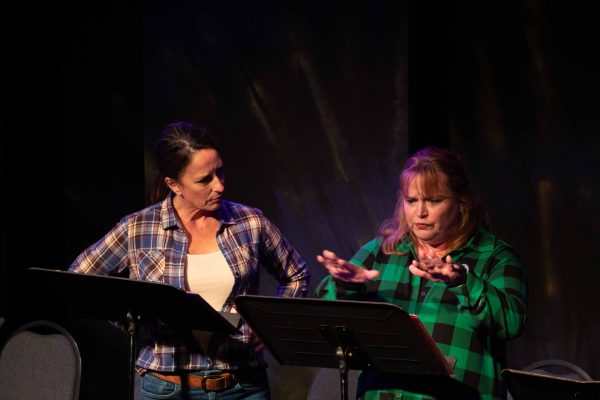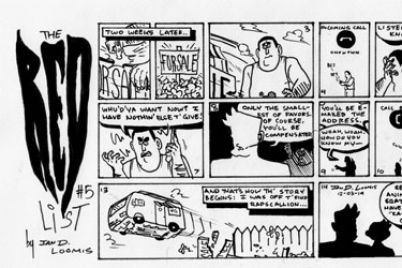
From left to right: Kez Settle (Bev) and Jeanine Thompson (Hildy). Danny Villalobos | Washtenaw Voice
By Ian D. Loomis
Contributor
Early versions of a play must find their way in the most crucial time of development: revision. At the 2019 Michigan Playwrights’ Festival, an assortment of such plays had this chance. Some might flourish into contemporary classics of the stage; some may not.
“The Lion’s Share” by Catherine Zudak: A modern Shakespeare (Oct. 24)
One could say the festival began as strongly as the protagonist of the first full-length play—but physically, or emotionally? An oft-told tale of the pacifistic warrior with political commentary hidden in plain sight, “The Lion’s Share” follows Leonis, a gruff, short-tempered and tragic Roman gladiator with a bit too much mercy and sympathy for his own good. Despite a conspicuously rushed ending, the characters and world were quick-witted, fast-paced and immersive. Inspired loosely by the Colin Kaepernick scandal, “Lion’s Share” is a thorough time-capsule analysis into whether or not sportsmen owe anything their fans, including the forfeit of their morals.
“Dear Camp” by Lisa MacDonald: A celebration of a culture on the descent (Oct. 25)
Bearing a clever title, “Dear Camp” was promising. Following her widowing, middle-aged Hildy invites her friends to her late husband’s hunting lodge as they prepare it to be sold. When Hildy uncovers her husband’s diary detailing his excursions with the mysterious “Cupcake,” old wounds are reopened. It sounds compelling and multifaceted; it did in fact catch me by surprise, but not how I’d expected. Beyond its abundantly witty Golden-Girls-esque dialogue and hysterical Michigander references, there seems to be a fairly stilted story with tacked-on plotlines, resolutions, and themes.
“Silo Tree” by Sam Collier: Short, sweet, haunting & heartbreaking (Oct. 26)
To begin with the twisted ramblings of coywolves—a vernacular fusion of Shakespearean witches and New York gangsters—is an investing beginning to be sure. The story beats are told in reverse chronological order, which worked well on the stage. Exploring a cerebral plane between the living and the afterlife, “Silo Tree” interweaves vignettes of those coming to terms with their recent demise with the story of the reigniting love between young women Lou and Wiley. Although the play could benefit from more intricate choreography and a score, it was still tear jerking, moving, and ultimately (and by far) served as my favorite piece of the festival.
“Blight” by R. D. Wakeman: Nonsensical omnipotence in slam poetry (Oct. 27)
The story seems straightforward: a young girl, Nanny, is trapped in her dystopian world where only she asks questions—“Whose baby is this? What is the deal with the cannibalistic carnival? What are those spies doing at the door?”—and nobody has the answers. The play had an aura-like presence of higher knowledge, of omnipotence to a catastrophic future. It was delivered in delightful word avalanches, rhymes, alliteration and homophones that kept me smiling. Most of all, it seemed to make sense. To pair content with form so seamlessly seemed too good to be true, and of course, as soon as I stepped out of the theater, I thought to myself: “What in the world was that?”


